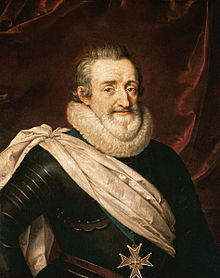 Global Information
Global InformationEdict of Nantes information


The Edict of Nantes (French: édit de Nantes) was signed in April 1598 by King Henry IV and granted the minority Calvinist Protestants of France, also known as Huguenots, substantial rights in the nation, which was predominantly Catholic.
While upholding Catholicism as the established religion, and requiring the re-establishment of Catholic worship in places it had lapsed,[1]: 721 it granted religious toleration to the Protestant Huguenots, who had been waging a long and bloody struggle for their rights in France. The main contents were:[2][3]
- Freedom of conscience and the right to practice their religion (Protestantism) in certain specified towns and cities throughout France.
- The right to hold public office, including the right to serve as judges and administrators, without having to renounce their religion.
- The right to maintain their own schools and universities, and to receive government funding for them.
- The right to fortify their towns and cities for their own protection.
- The right to maintain their own military forces (known as the "Huguenot militia"), which were to be paid for by the French government.
- The right to engage in certain specified trades and professions, including the manufacture and sale of textiles and arms.
- The right to travel freely throughout France, without being subject to searches or seizures of their property.
- The right to bury their dead in their own cemeteries.
The Edict of Nantes helped to end the Wars of Religion in France, which had been raging for decades. It also ensured that the Protestant minority in France would have a measure of religious and political freedom, and helped to establish France as a more tolerant and pluralistic society. However, the Edict was eventually revoked by King Louis XIV in 1685, leading to a mass exodus of Huguenots from France and a loss of talent and resources for the country.
In this edict, Henry aimed primarily to promote civil unity.[a] The edict separated civil from religious unity, treated some Protestants for the first time as more than mere schismatics and heretics and opened a path for secularism and tolerance. In offering a general freedom of conscience to individuals, the edict offered many specific concessions to the Protestants, such as amnesty and the reinstatement of their civil rights, including the right to work in any field, even for the state, and to bring grievances directly to the king. It successfully marked the end of the French Wars of Religion, which had afflicted France during the second half of the 16th century.
The Edict of St. Germain, promulgated 36 years earlier by Catherine de Médici, had granted limited tolerance to Huguenots but was overtaken by events, as it was not formally registered until after the Massacre of Vassy on 1 March 1562, which triggered the first of the French Wars of Religion.
The Edict of Fontainebleau, which revoked the Edict of Nantes in October 1685, was promulgated by Louis XIV, the grandson of Henry IV. This act drove an exodus of Protestants and increased the hostility of Protestant nations bordering France.
- ^ Lualdi, Katharine J. (2004). "Persevering in the Faith: Catholic Worship and Communal Identity in the Wake of the Edict of Nantes". The Sixteenth Century Journal. 35 (3): 717–734. doi:10.2307/20477042. ISSN 0361-0160.
- ^ Geoffrey Treasure, The Huguenots (Yale UP, 2015) pp 226–229.
- ^ Charles Tylor. The Huguenots in the Seventeenth Century (1892) pp 9–10.
Cite error: There are <ref group=lower-alpha> tags or {{efn}} templates on this page, but the references will not show without a {{reflist|group=lower-alpha}} template or {{notelist}} template (see the help page).